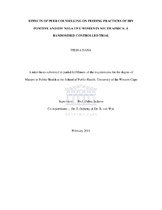| dc.description.abstract | Promotion of exclusive breastfeeding (EBF), (giving breast milk only without any solids or liquids), has proved to be very challenging in the South African context, although this infant feeding practice has been found to protect babies against diarrhoea and respiratory tract infections and to carry a lower risk of HIV infection than mixed feeding (breastfeeding combined with formula or solids). Study design: The PROMISE-EBF study is a multi-country cluster randomised trial to examine peer support to promote exclusive breastfeeding in Africa. For the South African site in the PROMISE-EBF study, three sites, Paarl, Rietvlei and Umlazi, were selected because of their different geographic settings and each site operated as a separate stratum for cluster selection and randomisation purposes. The clusters were then randomised into intervention and control arms making a total of 17 clusters in each arm. HIV positive and negative women in the intervention arm received support on their choice of infant feeding from the peer supporters who visited them at their homes while the women in the control group only received the standard infant feeding counselling and support provided by health care workers at health facilities. Data collection: Mothers were interviewed at recruitment during the antepartum period to establish eligibility, obtain informed consent and data on socio-economic status. Home visits were scheduled for data collection by trained data collectors at 3, 6, 12 and 24 weeks after birth. Analysis of results: This mini-thesis was a secondary analysis of the PROMISE-EBF data focusing on the South African data only. The data was adjusted for clustering and analysed using SAS. Comparison of variables between the intervention and control groups within sites was done. Results: A significant difference, regarding counselling and infant feeding practices, was observed among all women who received peer support compared to those who received the standard antenatal counselling, with more women in the intervention group (20.5%) practising EBF than those in the control group (12.8%) by Week 3. When the women's HIV status was considered, more than 65% of HIV positive and 40% of HIV negative women practised MF and EFF (giving formula milk only with no breast milk) throughout the study, respectively, regardless of the group they were in. For women who hadintended to practise EBF at recruitment, 33% in the control group and 20% in the intervention group actually practised EBF by Week 3. Regarding disclosure and feeding choice, 77.4% of women who had disclosed their HIV status actually practised MF versus 8.6% who practised EBF by Week 3.Conclusion: Community peer counselling should be strengthened as the results from this study showed that a high percentage of women who practised EBF were those who had received counselling, irrespective of their HIV status. The high percentage of HIV positive women who practised high risk feeding, despite receiving infant counselling, is of concern. Disclosure of the women's HIV status did not translate to them practising low risk infant feeding methods, which may suggest that there are other issues that determine the women's choice of infant feeding. | en_US |

